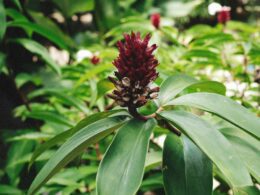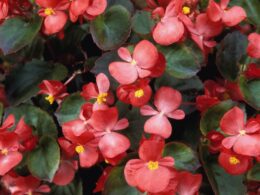If you’re a gardener, you know how important it is to take care of your herbs. And as winter approaches, you may be wondering whether you should cut them back or leave them be. The answer, as with many things in gardening, is: it depends.
First, you need to understand the specific types of herbs you have and how they behave in winter. Some herbs are annuals and die off completely, while others are perennials and die back to the ground but come back in the spring. Knowing this will help you make an informed decision about whether or not to cut back your herbs.
In this article, we’ll explore the factors you need to consider and the benefits and risks of cutting back your herbs for winter, as well as some tips for winter care. So, let’s get started!
Understanding Your Herbs
As you gaze upon your flourishing herb garden, you can feel the warmth of the sun and the fragrant aroma of fresh herbs filling your senses. Your herbs have grown beautifully, and now you’re wondering whether to cut them back for winter. The answer depends on the herb varieties and their growth habits.
Some herbs are perennials, which means they’ll come back year after year. Examples of perennials include rosemary, thyme, and sage. These herbs should be cut back in the fall after they’ve finished producing for the season. Cutting them back will encourage new growth in the spring and prevent them from becoming woody and unmanageable.
Annual herbs, on the other hand, complete their life cycle in one growing season. Examples of annuals include basil, cilantro, and parsley. These herbs should be harvested regularly throughout the growing season to encourage new growth. At the end of the season, they can be left to die back naturally or cut back to the ground. However, if you want to try to overwinter them, you can bring them indoors or take cuttings to root and grow indoors over the winter.
As you prepare your herb garden for winter, it’s important to understand the growth habits of your herbs. By cutting back perennials and harvesting annuals, you’ll help your herbs stay healthy and productive for years to come. With a little bit of care, your herb garden will continue to flourish and provide delicious flavors and aromas all year round.
Factors to Consider
Considering various factors is important when determining the appropriate maintenance for herb plants during the colder months. Climate considerations are crucial in deciding whether or not to cut back your herbs for winter.
If you live in a region with harsh winters, it may be best to cut back your herbs to avoid damage from the cold. On the other hand, if you live in a warmer climate, your herbs may continue to thrive through the winter and may not need to be cut back at all.
Another factor to consider is the growth pattern of your herbs. Some herbs, such as mint and chives, grow vigorously and may benefit from being cut back to promote healthier growth in the spring. Other herbs, like rosemary and thyme, are slower growing and may not need to be cut back as much, if at all.
It’s important to research the specific needs of each herb in your garden to determine the appropriate maintenance for the winter months. In the end, the decision to cut back your herbs for winter should be based on a combination of climate considerations and growth patterns.
By understanding the needs of your herb plants, you can ensure their health and longevity throughout the colder months. So, take the time to research and assess your herbs before making any decisions on winter maintenance.
Do Hostas Need to Be Cut Back for Winter?
Winter hosta pruning is essential for the health and appearance of these perennial plants. Cutting back hostas helps to remove any dead foliage, preventing disease and promoting new growth in spring. By trimming the leaves close to the ground and removing any debris, you can protect these beautiful plants during the cold winter months.
Benefits of Cutting Back Herbs
If you want to ensure a bountiful harvest of healthy herbs next spring, you’ll be glad to know that cutting them back now can lead to stronger growth and increased yields. Here are three benefits of cutting back your herbs for winter:
-
Promotes air circulation: Removing dead or damaged foliage and stems can help prevent moisture buildup, which can lead to fungal diseases. Air circulation is essential for the health of your herbs and encouraging new growth.
-
Encourages branching: Cutting back your herbs can stimulate branching, which leads to more leaves and a bushier plant. This can result in more culinary benefits, such as a more abundant harvest of fresh herbs for cooking.
-
Prepares for winter: Cutting back your herbs before the winter months can protect them from harsh weather conditions. It can also help prevent plants from becoming too top-heavy and breaking under the weight of snow or ice.
Incorporating these benefits into your herb maintenance routine can lead to healthier, more productive plants. Not only will you enjoy the culinary benefits of a bountiful herb harvest, but you’ll also be taking the necessary steps to ensure your plants’ safety during the winter months.
Risks of Cutting Back Herbs
You’ll be happy to know that cutting back your herbs can have some risks, but there are ways to minimize any negative effects.
One of the biggest risks is not using proper pruning techniques. If you cut too much of the plant, you may damage it or even kill it. Make sure you only cut back up to one-third of the plant at a time and avoid cutting into the woody parts of the stem.
Another risk of cutting back your herbs is that it may impact their preservation. Some herbs, like rosemary and thyme, can be damaged by cold weather. If you cut back the plant too much, you may expose it to the cold and cause it to die. To avoid this, make sure you leave enough foliage on the plant to protect it from the cold. You can also cover the plants with a blanket or burlap to provide additional protection.
In order to minimize any risks associated with cutting back your herbs, it’s important to use proper pruning techniques and preserve the health of the plant. By following these tips, you can ensure that your herbs will thrive and provide you with fresh, delicious ingredients all season long.
So don’t be afraid to cut back your herbs, just be sure to do it with care and attention to detail.
Will Cutting Herbs Back for Winter Help Them Survive?
Yes, cutting herbs back for winter will help them survive. Some herbs, like mint and chives, benefit from being trimmed down before the cold sets in. This allows the plant to redirect its energy into the roots and will help it to thrive when spring arrives. Overwintering geraniums worth it? It can be if you take the necessary steps to protect them from frost and cold temperatures.
Winter Care Tips
When it comes to caring for delicate herbs during the winter, there are a few key things to keep in mind. First, you’ll want to protect your plants from harsh winter weather by covering them or mulching around their base.
Second, be sure to water your herbs regularly to keep them healthy and hydrated.
Finally, don’t forget to do some light pruning to keep your herbs looking their best throughout the colder months.
By following these simple tips, you can help your herbs survive and thrive until springtime arrives once again.
Protecting Delicate Herbs
To protect delicate herbs from the harsh winter weather, it’s important to take a few precautions. Covering them with blankets or burlap sacks can help shield them from the cold, and staking them securely in the ground will prevent them from being blown away by strong winds. These simple steps can make a big difference in ensuring that your herbs survive the winter and continue to thrive come springtime.
If you’re worried about your herbs not making it through the winter, you might consider bringing them indoors and setting up an indoor herb garden. This way, you can continue to enjoy fresh herbs all winter long, and you won’t have to worry about the weather damaging your plants.
Just make sure that you’re drying your herbs properly before bringing them indoors, so that they don’t develop mold or mildew. With a little bit of care and attention, you can keep your herbs safe and healthy all winter long.
Mulching and Covering
Don’t let the cold weather damage your garden – protect your plants with mulching and covering techniques to ensure they survive the winter.
Here are some tips to help you choose the right mulch and winter coverings:
-
Choosing Mulch: There are different types of mulch you can use to protect your herbs during winter. Some common mulches include straw, shredded leaves, and wood chips. Make sure to choose a mulch that is appropriate for your herbs and the climate in your area. Mulch can help regulate the temperature and moisture levels around your herbs, protecting them from extreme cold and frost.
-
Winter Coverings: Covering your herbs during winter can also help protect them from the cold. You can use blankets, burlap, or frost cloth to cover your herbs at night. Make sure to remove the coverings during the day to allow sunlight and air to reach your herbs. You can also use cold frames or hoop houses to create a mini greenhouse environment for your herbs.
By using these mulching and covering techniques, you can help protect your delicate herbs from the harsh winter weather. Remember to choose the right mulch and coverings for your herbs and climate, and to remove the coverings during the day to allow sunlight and air to reach your plants.
Watering and Pruning
You’ll want to keep your garden healthy and thriving through the colder months by learning about watering and pruning techniques.
When it comes to watering, you’ll want to adjust your frequency and technique to match the changing temperatures. As the weather gets colder, your herbs won’t need as much water, so you’ll want to cut back on your watering schedule. Be sure to wait until the soil has dried out a bit before watering again, as over-watering can lead to root rot.
Timing is also important when it comes to pruning your herbs for the winter. You’ll want to avoid pruning too late in the season, as this can cause new growth that won’t have time to mature before the cold weather hits. It’s best to prune in the early fall, before the first frost.
When pruning, be sure to use clean, sharp tools to avoid damaging the plant.
By following these watering and pruning techniques, you’ll be able to keep your herbs healthy and strong throughout the winter months.
Frequently Asked Questions
How do I know when it’s the right time to cut back my herbs for winter?
When it comes to harvesting your herbs for winter, timing is key. You’ll want to wait until just before the first frost to cut them back, as this will help them retain their flavor and nutrients.
Before you do this, make sure to give your herbs a good watering to help them prepare for the cold weather ahead.
Once you’ve harvested your herbs, you can protect them from the winter chill by covering them with mulch or straw. This will help insulate the soil and keep your plants healthy until spring.
With these simple harvesting tips and winter protection strategies, you can ensure that your herbs will thrive all season long.
Can I still use my herbs for cooking after cutting them back for winter?
Looking to use your herbs for cooking after cutting them back for winter? There are a few harvesting tips you should keep in mind.
First, make sure to cut the herbs in the morning, after the dew has dried but before the heat of the day sets in. This will ensure that the oils and flavors are at their peak.
Next, be sure to wash and dry the herbs thoroughly before using them.
Finally, remember that the flavor of herbs can vary depending on the time of year and growing conditions, so it’s always a good idea to taste a small amount before using them in a dish.
With these tips in mind, you’ll be able to enjoy your freshly harvested herbs in all your winter cooking.
What is the best way to store herbs over the winter months?
To make sure you always have fresh herbs on hand during the winter months, it’s important to know how to properly store them.
Herb drying techniques are a great option for preserving herbs, as it allows you to keep them for a longer period of time without losing their flavor. You can hang your herbs upside down in a dry, well-ventilated area until they’re completely dry, and then store them in an airtight container.
Another option is to preserve your herbs in oil, which not only extends their shelf life, but also adds extra flavor to your dishes. Simply place your herbs in a jar and cover them with oil, making sure they’re completely submerged. Store the jar in a cool, dark place and use the oil as needed.
By using these techniques, you can enjoy fresh herbs all winter long without having to worry about them going bad.
Will cutting back my herbs help them grow better in the spring?
To ensure your herbs thrive during the winter months, it’s important to practice proper winter herb care. One of the key techniques is pruning. By cutting back your herbs in the fall, you’re removing any dead or diseased parts and encouraging new growth in the spring.
When pruning, be sure to use clean, sharp tools and make clean cuts at a 45-degree angle. This will not only help your herbs grow better in the spring, but it’ll also prevent any potential diseases from spreading.
So, before the winter chill sets in, take the time to prune your herbs and give them the best chance at a healthy and thriving season come spring.
Are there any herbs that should not be cut back for winter?
If you have perennial herbs in your garden, you may be wondering whether you should cut them back for the winter. While many herbs benefit from pruning, there are a few that should be left alone during the colder months.
For instance, sage, thyme, and lavender are all hardy herbs that can withstand the winter weather without any extra care. In fact, pruning these plants can actually do more harm than good, as it can leave them vulnerable to frost damage.
If you do need to prune your herbs, be sure to use the right pruning techniques to avoid damaging the plant. With careful attention, your herbs can thrive throughout the winter and come back even stronger in the spring.
Conclusion
So, should you cut back your herbs for winter? The answer is: it depends. It’s important to understand the specific needs and characteristics of each type of herb before making a decision.
Some herbs, like parsley and chives, can survive winter and continue to grow, while others, like basil and dill, are annuals that need to be replanted each year.
If you do decide to cut back your herbs, there are benefits, such as promoting new growth and preventing disease, but there are also risks, such as exposing the plant to cold temperatures and damaging the roots. It’s important to take proper precautions and follow specific guidelines for each type of herb to ensure their health and survival throughout the winter months.
With a little research and care, you can enjoy fresh herbs all year round.









